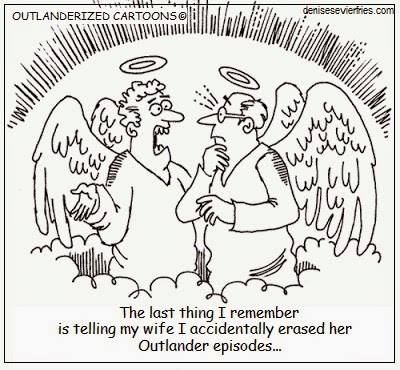This topic was originally a long post. It was suggested for this topic to be broken into three parts to make it easier for readers.
However, my last Outlander update and the last one for this year is about Geillis Duncan and her association with Reverend Campbell.
Geillis Duncan and her Association with Reverend Campbell
For this particular topic, I will concentrate on Black Jack, the Royal pardon and some information concerning the Duke.
Did the Duke send Black Jack to punish Fergus?
“Punishment,” he said softly. “But you know that, don’t you? Or at least your husband does.” (Gabaldon, “Dragonfly” 827)
“While for the good Captain – well, the army takes a very dim view of such unnatural predilections. The penalty is often death, in fact.” (Gabaldon, “Dragonfly” 827)
“He has linkages to several powerful interests among the French banking families, and more among the merchants. He is also received at Court, and has some access to Louis’s ear. In short, if he does not at present hold the power to command substantial sums of money and influence, he is likely to do so soon. He is also a member of not one but two of the more powerful Highland clans. And the parties who wish the personage in question to return to Rome harbor a not unreasonable fear that this influence might be exerted in undesirable directions. So much better if your husband were to return – his good name restored – to his lands in Scotland, do you not think?” (Gabaldon, “Dragonfly” 411)
“So you’re a Jacobite, are you? “ I asked
“Not necessarily,” the Duke answered genially. (Gabaldon, “Dragonfly” 830)
“My Valet,” said the Duke calmly. “Albert Danton, by name. A good fellow with neckcloths and stockings, but a trifle excitable, as so many of these Frenchmen are. Incredibly superstitious, too.” He frowned disapprovingly at the closed door. “Bloody papists, with all these saints and smells and such. Believe anything at all.” (Gabaldon, “Dragonfly” 825)
The text I bolded in the quotation above may explain where his interests lied. Most Scottish Highlanders were Roman Catholic back in the day. One of the main aims of Jacobitism was to restore a Roman Catholic Stuart King to the thrones of England, Scotland and Ireland. This does not mean that the Jacobites were all Roman Catholic; Protestants were also among the Jacobites. Basically Jacobitism was more of a political move than a religious one. Based on the Duke’s comments, it seems that he was not fond of Catholics.
It seems the Duke was playing a game in which he could gain something or lose nothing. If House Stuart were to take control of the throne, he would have gained a lot. If House Stuart were to fail in taking the throne, he would loose money but nobody would know he was supporting the cause. Was he willing to loose money for the Jacobite cause? Was that his money or was it Arthur Duncan’s? Publicly he would not loose anything. Was he a war instigator or a double agent? He probably sent Black Jack to attack both Jamie and Jenny to incite war since they have ties to two powerful clans. He could have been a Jacobite supporter but with a different political agenda. Frank Randall was probably right about him:
“But it seems from this that Jonathan Randall was entrusted with the job of stirring up Jacobite sentiments, if any existed, among the prominent Scottish families in the area. The point being to smoke out any baronets and clan chieftains who might be harboring secret sympathies in that direction. But that’s odd. Wasn’t Sandringham a suspected Jacobite himself?” Frank turned to the vicar, a frown of inquiry on his face. The vicar’s smooth, bald head creased in an identical frown. (Gabaldon, “Outlander” 25).
After posting several Outlander posts with dark characters, here is a funny image concerning the Outlander TV show by Denise Sevier Fries.
Excerpts from
Gabaldon, Diana. Outlander. New York: Bantam Books, 1991. Print.
Gabaldon, Diana. Dragonfly in Amber. New York: Bantam Dell, 1993. Print.
